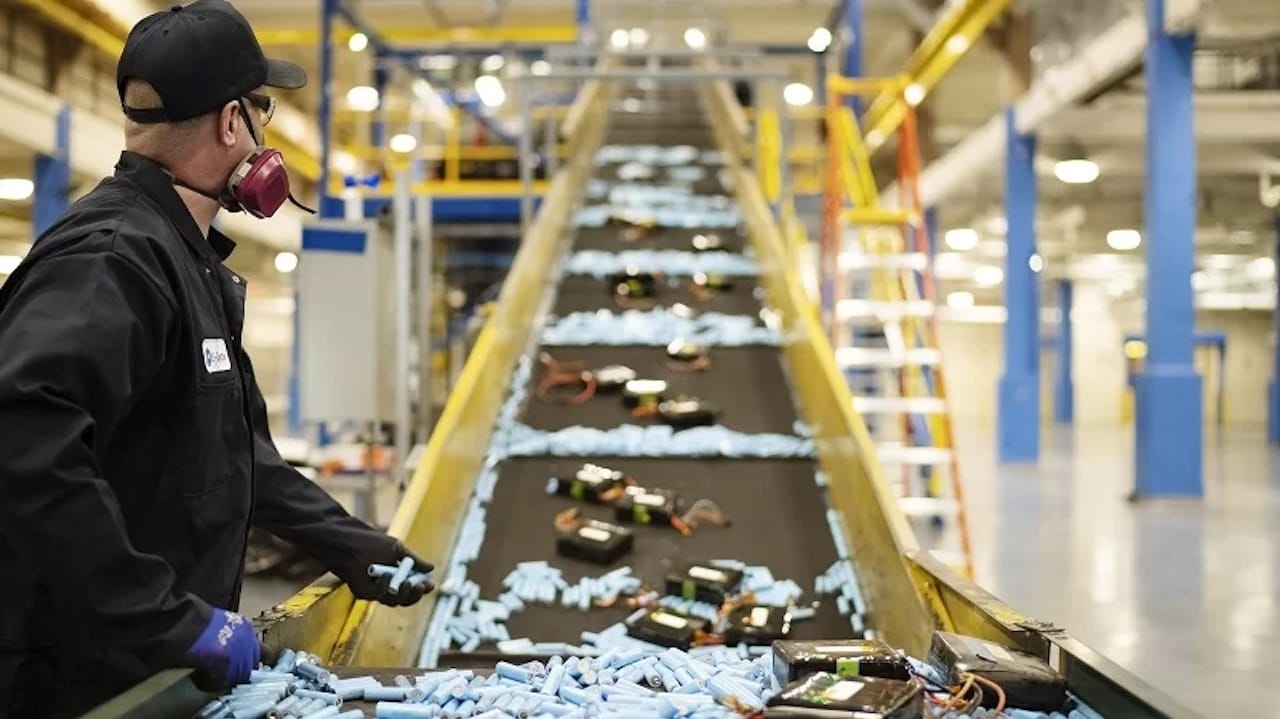Hey there,
Big climate news this week as Canada shared draft rules for an oil and gas emissions cap. We’ll unpack how the proposed cap would work and what it could mean for Canada’s climate ambitions.
We’ve also got Li-Cycle’s new commercial partnership with Glencore, a $3.14 billion loan for Vancouver mining company Lithium Americas, and Exterra’s joint carbon capture project with BASF.
Let’s go!
P.s. Enjoying the newsletter? Share it with someone in your network! And if you’re that someone, subscribe here.
TECH
Li-Cycle secures the bag

Source: Li-Cycle
Li-Cycle could be on the road to recovery after securing an offtake agreement with one of its investors.
What happened: Battery recycler Li-Cycle secured an agreement with mining giant Glencore for the battery materials produced at its Rochester, NY plant. The deal covers lithium carbonate and mixed metal products from the $960M facility.
The agreement could also help Li-Cycle meet the requirements of a $375 million loan from the U.S. Department of Energy (DOE), a key financial milestone for the Rochester hub.
The context: Battery recyclers have struggled to scale up, and Li-Cycle faced a number of setbacks over the past year. The company closed plants and delayed construction of its Rochester “hub” operation that would take in materials from “spoke” plants for final processing.
High interest rates, fluctuating commodity prices, and slower EV investments from North American car makers were all contributing factors. But the company also struggled to make financing, construction and offtake agreements line up. Glencore, a key investor, has stepped up several times to keep the company moving forward.
Why it matters: Li-Cycle's technology breaks down used batteries to recover valuable metals like lithium, nickel and cobalt. Recycling these materials reduces the need for new mining and cuts carbon emissions. The deal with Glencore helps keep Li-Cycle’s mission alive and secures a customer for their recycled materials.
The bottom line: A refreshed strategy and ongoing partnership with Glencore could put Li-Cycle back in a position to execute on its global battery recycling ambitions.
CLIMATE CAPITAL
🤖 Relocalize (Montreal, QC) landed an investment from accelerator Cycle Momentum for an undisclosed amount. The investment is part of Relocalize’s $5.8M seed round earlier this year. Relocalize is tackling emissions in the food supply chain through distributed and automated food production.
🎧 Go deeper: Listen to my conversation with Relocalize founder Wayne McIntyre on The Climate Cycle podcast
🚌 GreenPower Motor Company (Vancouver, BC) raised $4.16 million in a public offering to fund production of its electric school buses and commercial vehicles.
🔋 Neo Performance Materials (Toronto, ON) secured a $69.5 million credit facility from Export Development Canada to support construction of its magnet production plant in Estonia.
⛏ Lithium Americas (Vancouver, BC) secured a $3.14 billion loan from the U.S. Department of Energy to build lithium extraction and processing plants at the Thacker Pass lithium deposit. It’s the largest known lithium source in North America.
MILESTONES & PRODUCT
🔋 Long-duration energy storage startup e-Zinc opened a new production plant in Mississauga, ON. e-Zinc closed a $42 million Series A extension earlier this summer for its zinc-metal battery tech.
🏭 Exterra Carbon Solutions and BASF are teaming up on a carbon capture and storage project in Quebec that will combine BASF’s gas treatment tech and Exterra’s carbon mineralization tech.
🪵 Quebec forest products company Kruger will deploy the first demonstration-scale carbon capture and reuse project in an industrial pulp and paper facility with US-based Mantel Capture.
🏅 Foresight Canada launched its second Earth Tech 2050 cohort for companies focused on reducing emissions and the impacts of climate change. The cohort includes Ontoly Carbon, VulcanX, Carbonova and others.
Enjoying the newsletter? Help spread the word!
Share Climate Tech Canada with your network and earn rewards.
NEWS
Capping oil & gas emissions

Source: AER
As fossil fuel emissions continue to hold back progress on Canada’s climate goals, the federal government introduced rules to cap oil & gas emissions and drive investments in reducing pollution.
What happened: The feds announced new rules to cap emissions from the oil and gas sector. Companies will need to reduce their pollution by 35% below 2019 levels by 2030.
The government says the proposed cap is aligned with what is technically achievable in the sector while keeping room for “continued production growth”. Government modelling suggests production could grow 16% by 2032 and meet remaining demand with sought-after low-emitting oil.
The rules operate as a cap-and-trade system, where companies get an allowance for how much they can emit each year and can buy or sell allowances between each other. The system also allows companies to make payments or buy offsets covering a maximum of 20% of their emissions. Over time, fewer allowances will be given out as the cap declines to hit the target levels of emissions.
Why it matters: The oil and gas sector is the largest contributor to Canada’s emissions at 31%. We’re also the 4th largest oil producer and 5th for gas. The policy aims to balance Canada’s climate commitments while keeping the fossil fuel industry running.
Some fossil fuel proponents say that technology, not regulations, should drive Canada's climate efforts.
But fossil fuel companies have seen strong profits that have gone to shareholders or acquisitions rather than investments in decarbonization. That trend suggests that companies need a bigger nudge to make meaningful pollution cuts.
Yes, but: Alberta already has an industrial carbon pricing system, Technology Innovation and Emissions Reduction (TIER) that applies to oil and gas companies. Groups like Clean Prosperity argue that emissions targets could be better met by optimizing existing systems rather than layering on another program. New programs may be less politically durable than the existing industrial pricing.
What’s next: Final regulations are planned for next year, and there’s an open comment period from November to January. Regulations to limit methane in oil and gas are also slated for later this fall aim to cut methane by 75% from 2012 levels. The fate of the emissions cap will depend on whether the NDP and Bloc Quebecois continue to support the government.
IN THE NEWS
💰 Quebec is tackling productivity and sustainability with a new $4.5B program. Run by Investissement Québec, the Grand V program will offer loans aimed at helping Quebec businesses reduce their environmental footprint. That includes R&D for product improvements, adopting sustainable processes, and more.
🧑⚖ Alberta is challenging federal carbon pricing in court. At issue: the exemption for home heating oil. The province argues that the carve out is unconstitutional because the standards no longer apply evenly across the country as a national standard.
👎 United Conservative Party members voted to reject climate change science. The policy proposals from Alberta’s ruling party included abandoning efforts to reduce emissions that are fuelling climate change and recognizing CO2 as a vital element for life on earth. The CO2 motion is a common climate change misinformation talking point.
🚄 Electric high-speed rail is coming to the Quebec City-Toronto corridor. The project is years away, but could replace higher-emitting plane and car trips throughout the corridor and open the door for more high-speed projects. The feds were previously considering “high frequency rail”, but opted for the 300 km/h trains.
🔋 Japan’s Asahi Kasei will partner with Honda on a new battery separator plant in Canada. The deal is part of Honda’s wider electrification strategy. Meanwhile, Ford stepped back from a battery plant joint venture in Quebec as it rethinks its EV strategy. The other partner, South Korea’s EcoPro BM, plans to continue the plant and find other customers.
BIG PICTURE
What’s at stake in climate tech in the U.S. Presidential election
Microsoft is building the first data centres using cross-laminated timber to cut embodied emissions from steel and concrete.
CATL’s solution to EU tariffs? Become more European.
Airlines participating in CORSIA, an airline industry carbon market, can now use credits from Gold Standard, Verra, the Global Carbon Council, and Climate Action Reserve.
The UK will introduce a Carbon Border Adjustment Policy, following the EU. CBAM adds tariffs to imports with a high carbon footprint, levelling the playing field for lower-emitting domestic industries.
US regulators are trying to navigate the impact of data centres energy needs on everyday customers.
Water could be dramatically overlooked - and undervalued - according to a report from JP Morgan. Water attracts just 1.25% of climate tech investment.
Japan plans to open two nuclear plants that have been offline since the Fukushima earthquake.
Brookfield invests $2.3B in offshore wind, giving a major vote of confidence to the industry.
COMMUNITY
🗓️ Ottawa Climate Meetup: Join me at the monthly Ottawa Climate Meetup featuring a guest speaker and ecosystem mapping activity. Nov 14th, Ottawa.
🗓 Engineered Carbon Solutions: Join Climate North for an expert panel on engineered carbon removal and its role in staying below 1.5 degrees. November 19th, Toronto.
➡ Discover more climate events.
💻 Mysa is hiring Senior Full Stack Developers for their smart HVAC control platform.
➡️ Find more open roles.
Share Climate Tech Canada with your network and help us grow! Make {{ rp_num_referrals_until_next_milestone }} referrals to get a {{ rp_next_milestone_name }}. See all rewards here.
